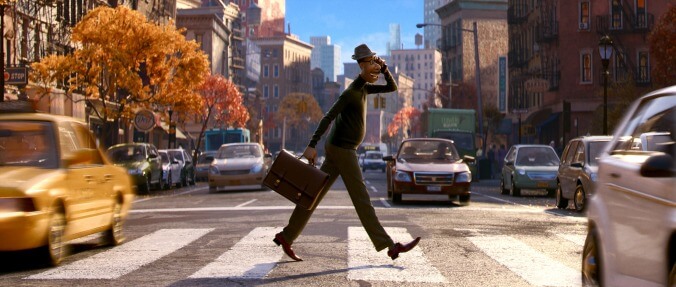Coming as it does from Pixar, it’s also a warmly human fantasia. The scenes not set in the cuddly netherworld take place instead in a bustling New York, populated by characters with expressive features and slightly exaggerated physiques. It’s here that Joe Gardener, a jazz pianist voiced by Jamie Foxx, steps into a manhole, ending his life just as he felt it was really beginning. When we first meet Joe, he’s teaching middle school band—the film cleverly opens with a clumsy cacophony, the offscreen sound of his students badly playing the Disney theme over the company logo. It isn’t long, though, before Joe catches the big break he’s been waiting for his whole career: a chance to play in the ensemble of a revered saxophonist (Angela Bassett). His dreams are finally coming true! Or so he thinks until he takes that fateful fall, and comes to in the form of a blobby, semi-opaque Casper: his untethered soul, still adorned with hat and glasses, riding an escalator to a premature heaven.
Soul is pioneering in one respect: It’s the first Pixar movie to center on a Black character, though he spends more than half of the brisk 100 minutes outside of his body. (As with Coco, the predominately white creative team has looked to outside hires to bolster the cultural authenticity, bringing aboard One Night In Miami… screenwriter Kemp Powers to co- write/direct.) In other respects, however, the film feels a little secondhand, a little Pixar redux. At this point, we’re supposed to be grateful for any break in the assembly line of sequels that now dominate a bit too much of this celebrated animation house’s resources. Yet in its lite existential musing, its gentle humor, its occasional bursts of genuine visual invention, Soul comes across like an appealing hodgepodge of past glories—the afterlife adventures of an aspiring musician, lassoed to the conceptual ambition of director Pete Docter’s previous project, Inside Out.
Unready to step into the light of The Great Beyond—visualized, spectacularly, as a giant white blotch on the black canvas of space—Joe ends up plummeting instead into The Great Before, where new souls are assigned personalities. You’d think that obsessions, along with traits like aloofness or curiosity, would form after birth. Soul asserts otherwise. Everyone, we learn, must acquire a “badge” before descending into a human body—in part by finding their “spark,” a.k.a. the one thing they’ll be most passionate about in life. Chillaxed atmosphere aside, it’s yet another of Pixar’s busy, bureaucratic other worlds. (Perhaps there’s some self-portrait in the studio’s regular creation of fantasy kingdoms that resemble, in their organization, giant corporations.) The script has no shortage of rules and principles to explain, at one point via a literal training video: There’s a vast desert called The Astral Plane, where the spiritually enlightened or creatively invigorated can project their consciousness, and a Hall Of You that’s basically a museum of memories and accomplishments, providing inspiration for young souls. It’s all very literal.
Soul sometimes echoes, again, the wonderful Inside Out, whose flood of expository information rarely drowned its wit, pathos, or insight into the human condition. But that film had a sharper clash of pathologies—and a more satisfying dramatic arc, too. Mistaken for one of the famous “mentors” that help souls find themselves in The Great Before, Joe ends up paired off with 22 (Tina Fey), a human-in-training who’s spent thousands of years half-heartedly searching for her spark, frustrating an encyclopedia’s worth of historical figures. Why has she given up on life before she’s lived it? Soul is a little shaky on that point. That 22 hasn’t yet found her personality is pretty clear, though: Her character seems a little half-formed, even with Fey lending the role shades of loopy mischief, withering sarcasm, and eventual wide-eyed wonder. Joe is better defined. Foxx strikes relatable notes, singing that old Pixar tune of adult regret and longing even when his character takes less-than-human form.
The animation is lovely, whether we’re in the ethereal, built-from-scratch Great Before or in the barbershops, music clubs, and subway cars of Joe’s home turf. Especially astonishing are the lighting techniques: Just as the studio once looked to Roger Deakins to give their lonely-robot adventure the texture of live action, here Pixar consults with the great cinematographer Bradford Young (Selma, Arrival), who’s become a Hollywood authority on properly capturing darker skin tones on screen. Elsewhere, Docter flirts with some more radical visual effects, as during Joe’s brief psychedelic plummet from one reality to another. One might wish that the storytelling, though, were as squiggly as The Counselors—or maybe that the filmmaker had sought more narrative inspiration in the unpredictable, freewheeling music Joe loves.
There’s something vaguely idiosyncratic about the structure, at least: The movie is nearly half over when it returns to Earth, resetting into a poky body-swap comedy. (Those with a feline fancy will be tickled.) As always, it’s easy to admire Pixar’s genuine interest in asking big questions about our place in the world. If Inside Out landed somewhere truly profound, imparting a rich emotional wisdom to all ages, the life lesson here is more shopworn: Joe, who can’t get over the feeling that he didn’t achieve enough, has to learn to appreciate the journey instead of obsessing over the destination—to see the beauty in the small, everyday stuff he took for granted. That might be a good tip, too, for anyone looking for bliss in Soul and its matters of life, death, and the meaning of each. It’s overflowing, like a bright portal into a new reality, with gorgeous details. So what if they don’t quite add up to a deeper whole?









































